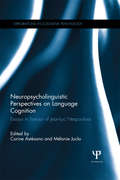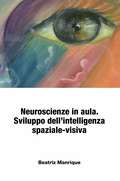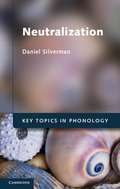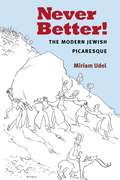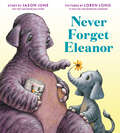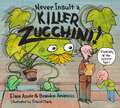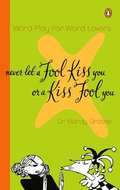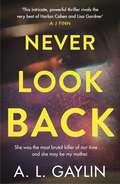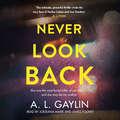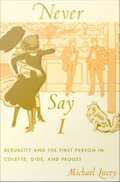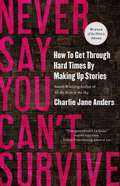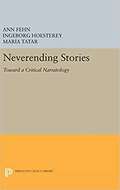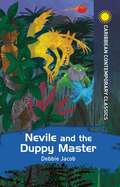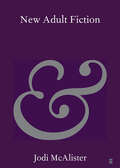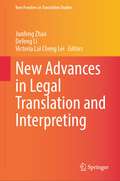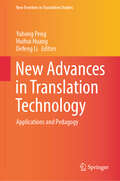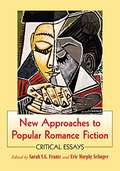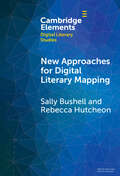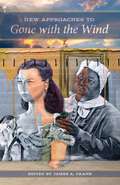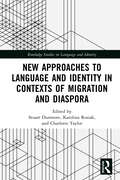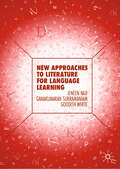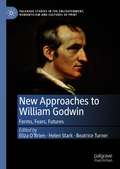- Table View
- List View
Neuropsycholinguistic Perspectives on Language Cognition: Essays in honour of Jean-Luc Nespoulous (Explorations in Cognitive Psychology)
by Corine Astesano Mélanie JuclaThis book brings together experts from the fields of linguistics, psychology and neuroscience to explore how a multidisciplinary approach can impact on research into the neurocognition of language. International contributors present cutting-edge research from cognitive and developmental psychology, neuropsychology, psycholinguistics and computer science, and discuss how this contributes to neuropsycholinguistics, a term coined by Jean-Luc Nespoulous, to whom this book is dedicated.Chapters illustrate how researchers with different methods and theoretical backgrounds can contribute to a unified vision of the study of language cognition. Reinterpreting neuropsycholinguistics through the lens of each research field, the book demonstrates important attempts to adopt a comprehensive view of speech and language pathology.Divided into three sections the book covers: <P><P> <li>linguistic mechanisms and the architecture of language <li>the relationship between language and other cognitive processes <li>the assessment of speech and language disabilities and compensatory mechanisms. <P><P>Neuropsycholinguistic Perspectives on Language Cognition presents a unique contribution to cognitive science and language science, from linguistics to neuroscience. It will interest academics and scholars in the field, as well as medical researchers, psychologists, and speech and language therapists.
Neuroscience and Multilingualism
by Edna AndrewsHow are languages represented in the human brain? Ideas from neuroscience have increasingly been applied to the study of language, exploring the neural processes involved in acquisition, maintenance and loss of language and languages, and the interaction between languages in bi- and multilingual speakers. With a sharp focus on multilingualism, this culmination of cutting-edge research sheds light on this challenging question. Using data from a variety of experiments, this is the first book length study to offer a new neuroscientific model for analysing multilingualism. Alongside a comprehensive analysis of the theoretical and experimental contributions to the field, it presents new data and analysis obtained from a multilingualism fMRI study. It also includes a unique longitudinal study of second and third language acquisition combined with extensive empirically valid language proficiency data of the subjects. A must-read for researchers and advanced students interested in neurolinguistics, second language acquisition, and bi- and multilingualism.
Neuroscienze in aula. Sviluppo dell’intelligenza spaziale-visiva.
by Giuseppina De Vita Beatriz ManriqueL’obiettivo centrale del testo è quello di facilitare l’accesso al discorso sulla neuroscienza e come utilizzarla in aula, principalmente attraverso lo sviluppo dell’intelligenza spaziale-visiva proposta tanto da Gardner come da Beauport, due teorici delle intelligenze multiple. Si sviluppa l’uso della visualizzazione, l’abilità per arrivare all’astrazione degli spazi, come opzione di attività in classe progettate nell’ottica di un’educazione integrale. I temi presentati sono organizzati in nove parti: l’introduzione, un’intervista a una famosa maestra, la bilateralità cerebrale, un modello di analisi che parte dall’insegnamento delle lingue, il lavoro con le immagini, l’intelligenza visiva e la creatività, le immagini in aula, una proposta di attività con immagini e le conclusioni. In ciascuna parte si sviluppano differenti aspetti relazionati all’applicazione delle neuroscienze in una classe di lingue straniere, ma solo come esempio di applicazione poiché che l’obiettivo dell’autrice è di presentare, in maniera chiara, l’applicabilità della neuroscienza a tutte le aree di insegnamento e con molti esempi che facilitino l’estrapolazione dell’informazione ad altri campi. L’intervista con una maestra venezuelana di larghe vedute - Alicia Steiner – è uno dei migliori esempi, poiché mostra di fatto che quando si vuole, ci si prepara e si agisce, si raggiungono gli obiettivi. Le pratiche che vengono suggerite e gli esercizi che vengono descritti sono stati utilizzati in aula dalla stessa autrice, che offre la possibilità di espandere il loro utilizzo ad altre aree. Infine, nel testo sono raccolte varie attività visive come esempi di possibile utilizzo nel primo giorno di lezione. Le conclusioni includono, inoltre, riflessioni su tutto il processo del lavoro del docente secondo questo metodo.
Neutralization
by Daniel SilvermanThe function of language is to transmit information from speakers to listeners. This book investigates an aspect of linguistic sound patterning that has traditionally been assumed to interfere with this function – neutralization, a conditioned limitation on the distribution of a language's contrastive values. The book provides in-depth, nuanced and critical analyses of many theoretical approaches to neutralization in phonology and argues for a strictly functional characterization of the term: neutralizing alternations are only function-negative to the extent that they derive homophones, and most surprisingly, neutralization is often function-positive, by serving as an aid to parsing. Daniel Silverman encourages the reader to challenge received notions by carefully considering these functional consequences of neutralization. The book includes a glossary, discussion points and lists of further reading to help advanced phonology students consolidate the main ideas and findings on neutralization.
Never Better!: The Modern Jewish Picaresque
by Miriam UdelIt was only when Jewish writers gave up on the lofty Enlightenment ideals of progress and improvement that the Yiddish novel could decisively enter modernity. Animating their fictions were a set of unheroic heroes who struck a precarious balance between sanguinity and irony that author Miriam Udel captures through the phrase "never better." With this rhetorical homage toward the double-voiced utterances of Sholem Aleichem, Udel gestures at these characters' insouciant proclamation that things had never been better, and their rueful, even despairing admission that things would probably never get better. The characters defined by this dual consciousness constitute a new kind of protagonist: a distinctively Jewish scapegrace whom Udel denominates the polit or refugee. Cousin to the Golden Age Spanish pícaro, the polit is a socially marginal figure who narrates his own story in discrete episodes, as if stringing beads on a narrative necklace. A deeply unsettled figure, the polit is allergic to sentimentality and even routine domesticity. His sequential misadventures point the way toward the heart of the picaresque, which Jewish authors refashion as a vehicle for modernism--not only in Yiddish, but also in German, Russian, English and Hebrew. Udel draws out the contours of the new Jewish picaresque by contrasting it against the nineteenth-century genre of progress epitomized by the Bildungsroman. While this book is grounded in modern Jewish literature, its implications stretch toward genre studies in connection with modernist fiction more generally. Udel lays out for a diverse readership concepts in the history and theory of the novel while also explicating the relevant particularities of Jewish literary culture. In addressing the literary stylistics of a "minor" modernism, this study illuminates how the adoption of a picaresque sensibility allowed minority authors to write simultaneously within and against the literary traditions of Europe.
Never Forget Eleanor
by Jason JuneThis poignant story from New York Times bestselling author Jason June and #1 New York Times bestselling illustrator Loren Long reminds us of the life-changing power of words and the ways we remember the ones we love who've been affected by Alzheimer's or dementia. Perfect for fans of Drawn Together and The Rough Patch. Elijah loves spending time with his grandma Eleanor. She knows all the best words to answer tricky crossword puzzles and to tell the most beautiful stories to her family and friends.Everyone calls her “Never Forget Eleanor” because she remembers every word she reads and person she meets. Lately though, Elijah has started to notice Grandma Eleanor forgetting little things.So when Grandma Eleanor doesn’t show up for her Saturday story session, Elijah will need to find a way to use her favorite words and become the storyteller himself to bring her home.
Never Insult a Killer Zucchini
by Elana Azose Brandon AmancioThis is one science fair you&’ll never forget! When Mr. Farnsworth, the science-fair judge, declares that he loves zucchinis, the Killer Zucchini is smitten. As the judge makes his way through the exhibits alphabetically—A (antimatter), B (bionic limb), C (cloning)—the Killer Zucchini tries to show his affection. But when Mr. F gets to K and admits he likes to eat zucchini with ranch dressing, the Killer Zucchini gets steamed and attempts to exact his revenge on the snack-loving judge using the other science-fair projects as his means to an end. Hilarious havoc ensues as the entire science fair is destroyed by his wrath. Engaging backmatter provides the science behind the science fair entries created by the characters in the story.
Never Let a Fool Kiss You or a Kiss Fool You
by Mardy GrotheWhat do Mae West, John F. Kennedy, Victor Hugo, and H. L. Mencken have in common? They all indulged in chiasmus-a literary device in which word order is reversed to hilarious or poignant effect. When Mae West said, "It's not the men in my life, it's the life in my men," she was using chiasmus; when John F. Kennedy said, "Ask not what your country can do for you, ask what you can do for your country," he was doing the same. Dr. Mardy Grothe has compiled hundreds of examples of chiasmus in this whimsically illustrated collection, bringing this witty and thought-provoking device out of obscurity and into the public imagination. "There is plenty of delight in this overdue collection. " (Houston Chronicle)
Never Look Back: She was the most brutal serial killer of our time. And she may have been my mother.
by A.L. Gaylin'Aflame with tension. An intricate, powerful thriller - rivals the very best of Harlan Coben and Lisa Gardner' AJ Finn, author of THE WOMAN IN THE WINDOW*****************She was the most brutal killer of our time. And she may have been my mother...When website columnist Robin Diamond is contacted by true crime podcast producer Quentin Garrison, she assumes it's a business matter. It's not. Quentin's podcast, Closure, focuses on a series of murders in the 1970s, committed by teen couple April Cooper and Gabriel LeRoy. It seems that Quentin has reason to believe Robin's own mother may be intimately connected with the killings.Robin thinks Quentin's claim is absurd. But is it? The more she researches the Cooper/LeRoy murders herself, the more disturbed she becomes by what she finds. Living just a few blocks from her, Robin's beloved parents are the one absolute she's always been able to rely upon, especially now amid rising doubts about her husband and frequent threats from internet trolls. Robin knows her mother better than anyone.But then her parents are brutally attacked, and Robin realises she doesn't know the truth at all...*****************'Completely absorbing with a knock-out twist' Harlan Coben'Gaylin is an expert at acute emotional observation combined with seamless plotting' Alex Marwood'AL Gaylin is at the top of her game, crafting exhilarating and audacious crime novels that are both rich in character and rivetingly told. They are, quite simply, not to be missed' Megan Abbott'AL Gaylin is a storyteller guaranteed to keep you up at night' Laura Lippman'AL Gaylin is a great storyteller' Mark Billingham'A fiendishly well-told thriller that deepens its grip the faster you read - I loved it' Louise CandlishIf you love Serial, S-Town, Clare Mackintosh, Cara Hunter, KL Slater or Lisa Jewell, you will be utterly gripped by this psychological thriller with a twist you'll never see coming...
Never Look Back: She was the most brutal serial killer of our time. And she may have been my mother.
by A.L. GaylinShe was the most brutal killer of our time. And she may have been my mother...When website columnist Robin Diamond is contacted by true crime podcast producer Quentin Garrison, she assumes it's a business matter. It's not. Quentin's podcast, Closure, focuses on a series of murders in the 1970s, committed by teen couple April Cooper and Gabriel LeRoy. It seems that Quentin has reason to believe Robin's own mother may be intimately connected with the killings.Robin thinks Quentin's claim is absurd. But is it? The more she researches the Cooper/LeRoy murders herself, the more disturbed she becomes by what she finds. Living just a few blocks from her, Robin's beloved parents are the one absolute she's always been able to rely upon, especially now amid rising doubts about her husband and frequent threats from internet trolls. Robin knows her mother better than anyone.But then her parents are brutally attacked, and Robin realises she doesn't know the truth at all...
Never Say I: Sexuality and the First Person in Colette, Gide, and Proust
by Michael LuceyNever Say I reveals the centrality of representations of sexuality, and particularly same-sex sexual relations, to the evolution of literary prose forms in twentieth-century France. Rethinking the social and literary innovation of works by Marcel Proust, Andr Gide, and Colette, Michael Lucey considers these writers' production of a first-person voice in which matters related to same-sex sexuality could be spoken of. He shows how their writings and careers took on political and social import in part through the contribution they made to the representation of social groups that were only slowly coming to be publicly recognized. Proust, Gide, and Colette helped create persons and characters, points of view, and narrative practices from which to speak and write about, for, or as people attracted to those of the same sex. Considering novels along with journalism, theatrical performances, correspondences, and face-to-face encounters, Lucey focuses on the interlocking social and formal dimensions of using the first person. He argues for understanding the first person not just as a grammatical category but also as a collectively produced social artifact, demonstrating that Proust's, Gide's, and Colette's use of the first person involved a social process of assuming the authority to speak about certain issues, or on behalf of certain people. Lucey reveals these three writers as both practitioners and theorists of the first person; he traces how, when they figured themselves or other first persons in certain statements regarding same-sex identity, they self-consciously called attention to the creative effort involved in doing so.
Never Say You Can't Survive
by Charlie Jane AndersWINNER OF THE 2022 HUGO AWARD FOR BEST RELATED WORKFrom Charlie Jane Anders, the award-winning author of novels such as All the Birds in the Sky and The City in the Middle of the Night, this is one of the most practical guides to storytelling that you will ever read.The world is on fire.So tell your story.Things are scary right now. We’re all being swept along by a tidal wave of history, and it’s easy to feel helpless. But we’re not helpless: we have minds, and imaginations, and the ability to visualize other worlds and valiant struggles. And writing can be an act of resistance that reminds us that other futures and other ways of living are possible.Full of memoir, personal anecdote, and insight about how to flourish during the present emergency, Never Say You Can’t Survive is the perfect manual for creativity in unprecedented times.At the Publisher's request, this title is being sold without Digital Rights Management Software (DRM) applied.
Neverending Stories: Toward A Critical Narratology (Princeton Legacy Library #1209)
by Maria Tatar Ann Fehn Ingeborg HoestereyIn these compelling new essays, leading critics sharpen our understanding of the narrative structures that convey meaning in fiction, taking as their point of departure the narratological positions of Dorrit Cohn, Grard Genette, and Franz Stanzel. This collection demonstrates how narratology, with its attention to the modalities of presenting consciousness, offers a point of entry for scholars investigating the socio-cultural dimensions of literary representations. Drawing from a wide range of literary texts, the essays explore the borderline between fiction and history; explain how characters are constructed by both author and reader through the narration of consciousness; show how gender shapes narrative strategies ranging from the depiction of consciousness through intertextuality to the representation of the body; address issues of contingency in narrative; and present a debate on the crucial function of person in the literary text. The contributors are Stanley Corngold, Gail Finney, Kte Hamburger, Paul Michael Ltzeler, David Mickelsen, John Neubauer, Thomas Pavel, Jens Rieckmann, Shlomith Rimmon-Kenan, Judith Ryan, Franz Stanzel, Susan Suleiman, Maria Tatar, David Wellbery, and Larry Wolff.
Nevile and the Duppy Master
by Debbie JacobThis second book in the Nevile series takes the band of companions deeper into the mystery of the evil king's rise to power. Can he be brought to justice?Suspicion looms large and deception rules the day as Nevile plots to depose the evil king of Aribbea in the year 2222. To succeed, the famous bridge builder must convince Nina, A.T. and Hunn Dread to support his mission, but everyone feels torn in different directions. Nina's bond with Hanuman the monkey leads her on a new path in life; A.T. is content with power over his own canton and Hunn Dread emerges as Nevile's rival for Nina's affection. As usual, Pierre the bacoo is sneaking off to stir up trouble with his lies. Success now depends on Nevile questioning the Royal Record Keeper to unlock the mystery of the keys in the treasure chest Nina discovered when she first found land and changed the course of the three bridgers' lives. Nevile's first test comes in Xaymaca's elfin forest where duppies confront Nevile's party. Will Nevile unite his friends, Papa Bois' folk, the bridgers and the salt miners to overthrow the king? Will he feel forced to choose between Nina and Seamstress Number 2, who once saved his life? Will he discover SN2's secret? Excitement mounts and tempers flare as Nevile builds his fighting force joined by a second Guyanese genie, a duppy and a forest creature. Will Nevile win freedom for Aribbea from the king?
Nevile and the Duppy Master (Caribbean Modern Classics)
by Debbie JacobThis second book in the Nevile series takes the band of companions deeper into the mystery of the evil king's rise to power. Can he be brought to justice?Suspicion looms large and deception rules the day as Nevile plots to depose the evil king of Aribbea in the year 2222. To succeed, the famous bridge builder must convince Nina, A.T. and Hunn Dread to support his mission, but everyone feels torn in different directions. Nina's bond with Hanuman the monkey leads her on a new path in life; A.T. is content with power over his own canton and Hunn Dread emerges as Nevile's rival for Nina's affection. As usual, Pierre the bacoo is sneaking off to stir up trouble with his lies. Success now depends on Nevile questioning the Royal Record Keeper to unlock the mystery of the keys in the treasure chest Nina discovered when she first found land and changed the course of the three bridgers' lives. Nevile's first test comes in Xaymaca's elfin forest where duppies confront Nevile's party. Will Nevile unite his friends, Papa Bois' folk, the bridgers and the salt miners to overthrow the king? Will he feel forced to choose between Nina and Seamstress Number 2, who once saved his life? Will he discover SN2's secret? Excitement mounts and tempers flare as Nevile builds his fighting force joined by a second Guyanese genie, a duppy and a forest creature. Will Nevile win freedom for Aribbea from the king?
New Adult Fiction (Elements in Publishing and Book Culture)
by Jodi McAlisterThe term 'new adult' was coined in 2009 by St Martin's Press, when they sought submissions for a contest for 'fiction similar to YA that can be published and marketed as adult – a sort of 'older YA' or 'new adult'.' However, the literary category that later emerged bore less resemblance to young adult fiction and instead became a sub-genre of another major popular genre: romance. This Element uses new adult fiction as a case study to explore how genres develop in the twenty-first-century literary marketplace. It traces new adult's evolution through three key stages in order to demonstrate the fluidity that characterises contemporary genres. It argues for greater consideration of paratextual factors in studies of genre. Using a genre worlds approach, it contends that in order to productively examine genre, we must consider industrial and social factors as well as texts.
New Advances in Legal Translation and Interpreting (New Frontiers in Translation Studies)
by Defeng Li Junfeng Zhao Victoria Lai Cheng LeiThis book describes interdisciplinary exploration of matters related to the translation and interpreting of legal texts. Translation of legal texts has grown exponentially since the beginning of new millennium in response to the fast-increasing volume of international trade and business as well as all sorts of other transnational activities in a myriad of spheres. International trade demands translation of trade laws and business contracts, immigration leads to rise in court interpreting services, and countries may seek to enhance their international influence through translating and making known to the world their laws and/or other legal documents. These legal translation activities occurred mostly between languages officially used in international or regional organizations, such as the United Nations and the European Union, and between the languages of major countries who exert or seek influence on international economy and law. On the other hand, rapid advances in computer technology and artificial intelligence in recent years have also brought about changes in the practices of legal translation. With changes also come problems in both theory and practice that merit our immediate attention. This edited volume highlights the newest developments in the theory, practice, and training of legal translation, with contributions from international leading researchers in this area. It will be a standard reference for anyone who is to embark on research and practice of legal translation in the twenty-first century. It is also adaptable as teaching materials for translation and interpreting training.
New Advances in Translation Technology: Applications and Pedagogy (New Frontiers in Translation Studies)
by Defeng Li Yuhong Peng Huihui HuangFrom using machine learning to shave seconds off translations, to using natural language processing for accurate real-time translation services, this book covers all the aspects. The world of translation technology is ever-evolving, making the task of staying up to date with the most advanced methods a daunting yet rewarding undertaking. That is why we have edited this book—to provide readers with an up-to-date guide to the new advances in translation technology. In this book, readers can expect to find a comprehensive overview of all the latest developments in the field of translation technology. Not only that, the authors dive into the exciting possibilities of artificial intelligence in translation, exploring its potential to revolutionize the way languages are translated and understood. The authors also explore aspects of the teaching of translation technology. Teaching translation technology to students is essential in ensuring the future of this field. With advances in technology such as machine learning, natural language processing, and artificial intelligence, it is important to equip students with the skills to keep up with the latest developments in the field. This book is the definitive guide to translation technology and all of its associated potential. With chapters written by leading translation technology experts and thought leaders, this book is an essential point of reference for anyone looking to understand the breathtaking potential of translation technology.
New Adventures: A Harcourt Reading Program (Grade #3)
by HarcourtAn interactive set of short stories with exercises focusing on specific skills like, prefixes and suffixes, vocabulary, synonyms and antonyms etc.
New Approaches To Popular Romance Fiction: Critical Essays
by Eric Murphy Selinger Sarah S. G. FrantzDespite the prejudices of critics, popular romance fiction remains a complex, dynamic genre. It consistently maintains the largest market share in the American publishing industry, even as it welcomes new subgenres like queer and BDSM romance. Digital publishing originated in erotic romance, and savvy online communities have exploded myths about the genre's readership. <P><P>Romance scholarship now reflects this diversity, transformed by interdisciplinary scrutiny, new critical approaches, and an unprecedented international dialogue between authors, scholars, and fans. These eighteen essays investigate individual romance novels, authors, and websites, rethink the genre's history, and explore its interplay of convention and originality. By offering new twists in enduring debates, this collection inspires further inquiry into the emerging field of popular romance studies.
New Approaches for Digital Literary Mapping: Chronotopic Cartography (Elements in Digital Literary Studies)
by Sally Bushell Rebecca Louise HutcheonThis Element reconsiders what the focus of digital literary mapping should be for a subject like English Literature, what digital tools should be employed and to what interpretative ends. How we can harness the digital to find new ways of understanding spatial meaning in the Humanities? Section 1 provides a brief overview of the relationship between literature, geography and cartography and the emergence of literary mapping, providing a critique of current digital methods and making the case for new approaches. The second section turns to Russian theorist Mikhail Bakhtin and explores the potential of the 'chronotope' for literature as a way of structuring digital literary maps that provides a solution to the complexities of mapping time as well as space. Sections 3 and 4 then exemplify the method by applying it first to realist novels by Dickens and Hardy then the multiple states of J. M. Barrie's Peter Pan. This title is also available as Open Access on Cambridge Core.
New Approaches to Gone With the Wind (Southern Literary Studies)
by James A. CrankSince its publication in 1936, Gone with the Wind has held a unique position in American cultural memory, both for its particular vision of the American South in the age of the Civil War and for its often controversial portrayals of race, gender, and class. New Approaches to "Gone with the Wind" offers neither apology nor rehabilitation for the novel and its Oscar-winning film adaptation. Instead, the nine essays provide distinct, compelling insights that challenge and complicate conventional associations. Racial and sexual identity form a cornerstone of the collection: Mark C. Jerng and Charlene Regester each examine Margaret Mitchell's reframing of traditional racial identities and the impact on audience sympathy and engagement. Jessica Sims mines Mitchell's depiction of childbirth for what it reveals about changing ideas of femininity in a postplantation economy, while Deborah Barker explores transgressive sexuality in the film version by comparing it to the depiction of rape in D. W. Griffith's earlier silent classic, Birth of a Nation. Other essays position the novel and film within the context of their legacy and their impact on national and international audiences. Amy Clukey and James Crank inspect the reception of Gone with the Wind by Irish critics and gay communities, respectively. Daniel Cross Turner, Keaghan Turner, and Riché Richardson consider its aesthetic impact and mythology, and the ways that contemporary writers and artists, such as Natasha Trethewey and Kara Walker, have engaged with the work. Finally, Helen Taylor sums up the pervading influence that Gone with the Wind continues to exert on audiences in both America and Britain. Through an emphasis on intertextuality, sexuality, and questions of audience and identity, these essayists deepen the ongoing conversation about the cultural impact and influence of this monumental work. Flawed in many ways yet successful beyond its time, Gone with the Wind remains a touchstone in southern studies.
New Approaches to Language and Identity in Contexts of Migration and Diaspora (Routledge Studies in Language and Identity)
by Charlotte Taylor Stuart Dunmore Karolina RosiakNew Approaches to Language and Identity in Contexts of Migration and Diaspora draws together expertise and contemporary research findings in respect of language and identity in migrant and diasporic contexts throughout the world.Over thirteen chapters, contributors examine the intersection between migration, language, and identity through analyses of migration discourses, language practices, and legal policy, as well as the ideologies embedded and revealed within them. A wide range of subject areas and interdisciplinary approaches are represented, with fifteen authors drawn from the fields of education, intercultural communication, linguistics, geography, migration studies, psychology, and sociology.This volume will primarily appeal to scholars and researchers in fields such as migration, intercultural communication, sociolinguistics, bilingualism, multilingualism, and heritage language learning.
New Approaches to Literature for Language Learning
by Goodith White Jeneen Naji Ganakumaran SubramaniamThis book unpacks recent changes in the landscape of literature and language teaching, and aims to find new explanations for the altered relationships between readers and writers, the democratisation of authorship, and the emergence of new ways of using language. By examining topics as various as literature and technology, multimodality, and new Englishes, the authors take a fresh look at the use of literature as a tool in the teaching of English to second-language speakers. More than simply a way of teaching aesthetic and ethical values and rhetorical skills, they argue that literature can also be used to help students to critically evaluate assumptions about society, culture and power which underpin the production and reception of texts. The book relates theories of language acquisition and literary criticism to examples of literary texts from a wide range of global literature in English, and discusses new ways of engaging with it, such as transmedia story telling, book blogs and slam poetry. It will be of interest to language teachers and teacher trainers, and to students and scholars of applied linguistics, TESOL, and digital literacies.
New Approaches to William Godwin: Forms, Fears, Futures (Palgrave Studies in the Enlightenment, Romanticism and Cultures of Print)
by Beatrice Turner Eliza O’Brien Helen StarkThis collection showcases work on William Godwin (1756-1836) foregrounding new critical approaches and uncovering new texts. Godwin is a familiar presence in scholarship on the Shelley-Godwin circle and on Dissenting intellectual circles, but the present collection considers him closely as an author and thinker on his own terms. The range of texts and topics covered by this collection will be of interest both to scholars familiar with Godwin and those approaching his work for the first time.
